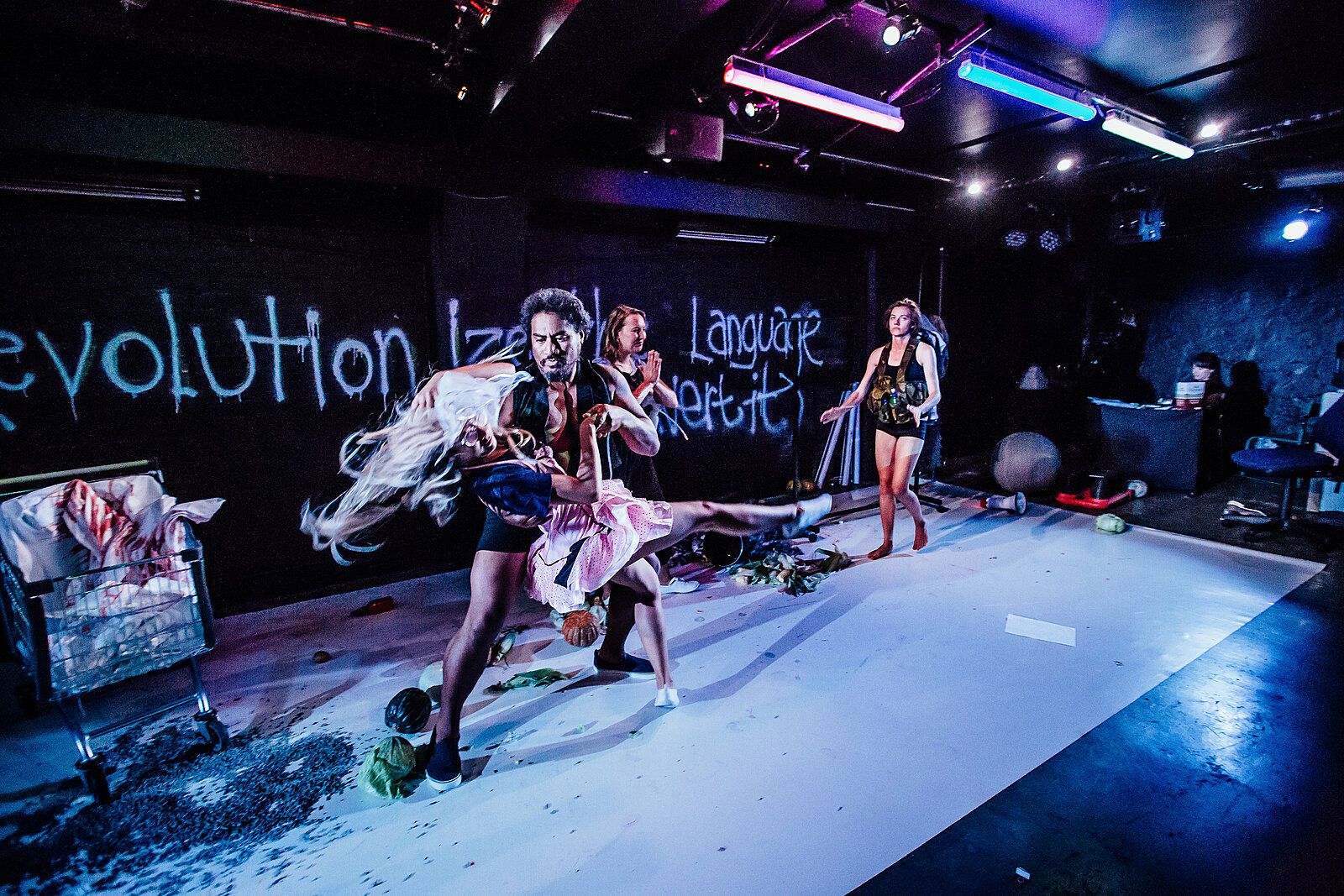Mondays Off: A Review of Revolt. She said. Revolt again
Jess Bates joins the anarchy of Silo's Revolt. She said. Revolt again.
Jess Bates joins the anarchy of Silo's Revolt. She said. Revolt again, revels in its subversion and wonders if its own maxims have a place in its process.
It’s Silo’s opening night of their 2017 season and the Basement Theatre is agog with that heady mix of the well-dressed and the well-known. With both Pride Festival and Auckland Fringe Festival lighting a fire under Auckland’s cultural arse, it’s no surprise that the Basement feels a little electric right now. This week’s programming is nothing short of a battlecry. In the Studio, FAFSWAG, a crew of vogue queens, are disrupting space with their decolonised femme bodies in their show FemSlick. In the main space, Silo is serving up feminism full throttle with playwright Alice Birch’s uncompromising text Revolt. She said. Revolt again. Someone sashays by, shouting over their shoulder that they saw me at the Peaches concert. At least six faces from the recent Treat Her Right equal pay campaign video are here, and I am not the only one singing along to the militant, lyrical beats of Princess Nokia’s TomBoy as we sit down. Something is stirring in this city. Who knows? If the revolution is coming tonight - we might just be ready for it.
The text of Revolt. She said. Revolt again. is no squeaking minnow. As Kate Prior points out in the accompanying programme essay (which you can also read here) the text bears much similarity to audacious feminist text the SCUM Manifesto: a call to re-order the world by upending the gender binary, and ultimately, “eliminating all men.” As such, Birch’s play operates without narrative, positioning each scene in a different banal moment where the gender divide can be elucidated, and uses each such moment to rearrange that power structure. The first of these: REVOLUTIONISE THE LANGUAGE (INVERT IT), thrusts us right into the ribcage of the act of writing itself - unpacking the way we use language to describe sex, and offering a glittering alternative to redress the balance. A hot debate emerges on whether one can ‘take’ a vagina, depending on its framing: is it a ‘gap’ or an ‘organ’? The significance of the semantics crackle on the stage. The set places the performers in what is ostensibly a gallery, providing the white-box minimalism that Silo is renowned for, but it nods to a space that is scientific. We are seeing test-tube linguistics, where actors Fasitua Amosa and Sophie Henderson perform an experiment in word-choice.
Amosa and Henderson bring no small amount of comedy and life to the scene: we are treated to a fearless, dirty-talking pair, discursively consuming and entering each other like an Amy Schumer wet dream. Henderson spits, and the whole audience loves her for it. Seeing theatre’s deeply femme sweetheart Henderson pushing so hard into a sexual reframing, and one where she holds the power, is satisfying. Henderson is red, heaving and unapologetic, reluctantly taking her “massive, structured, beautifully built, almighty vagina” off Amosa, as consolation for his visible distress. It is a striking reimagining of the status quo, both in the clarity of the current problem (the verbs of sex are gendered) and the simplicity of the solution (invert the words). The one request the playwright makes is that "this play should not be well-behaved.” By virtue of Henderson’s face, strained with the pleasure of giving birth to a new language of possibility, this is a suitably anarchic opener.
The one request the playwright makes is that "this play should not be well-behaved.” By virtue of Henderson’s face, strained with the pleasure of giving birth to a new language of possibility, this is a suitably anarchic opener.
If this production is to be tested by its ‘bad behaviour’, director Virginia Frankovich is a strong fit. Her directing record is one of playful, charged and visceral productions, including If There’s Not Dancing in the Revolution (with performer Julia Croft), and Car. Both promoted a scrambling, unapologetic aesthetic, heavy on improvisation and clown, often making the audience if not the agent of, then assistant to, the action itself. These impulses, however, feel reined in for Revolt. It’s true that there is no pretension to artifice - we know we are watching a play. Dan Williams’ set posits ‘offstage’ simply to the side of the white box, where props, notes, a wedding cake and a deliciously bored stage manager (Eliza Rutter) sit patiently. The collapse of ‘show’ into ‘life’ is a well-oiled metaphor here, but by Frankovich’s standards, the choices to foreground this do seem conservative. Admittedly, there are moments where audience members become vox pops, or provide illustrations for the actors, but these feel more fleeting and less intentional than I might hope. It is pleasant to watch the space of the theatre deconstructed by seeing ‘backstage’, a la Eli Kent's All Your Wants And Needs Fulfilled Forever, or Kip Chapman's Hudson and Halls, but I never feel utterly immersed, and I can’t help feeling that Frankovich is being somewhat restrained.
There are still bold and visually satisfying choices: a giant pair of projected lips commands the stage in transitions, narrating the subtitles with a manufactured soothing tone, like a great orifice/oracle to our futuristic feminist imaginary. Claire Duncan’s soundscape is an umbrella across the scenes, providing a simmering build from dance beat adrenaline to lounge-head jazz, and every cast member is consistently activated when they have no dialogue. In the scene of a marriage proposal, entitled REVOLUTIONISE THE WORLD (DO NOT MARRY), we arrive just as our bride-not-to-be (Michelle Ny) is responding to Amosa, down on bended knee. Henderson’s diligent and attentive maitre’d and Amanda Tito’s churlish violin player are the perfect accoutrements to the rapidly dwindling romance that plays out. Ny levels with Amosa that asking for a hand in marriage is tantamount to a request to reduce one’s income tax and as she turns away a glass of champagne, the stony stage manager coiffs it quickly off-stage. This has the lovely consequence of revealing the impact of every character, as they make their choices. Ny’s stoic cynicism, while not exactly accurate to our taxation laws in NZ, rings familiar to me: my parents’ bore the same pragmatic viewpoint, a sentiment which seems to have been freshly buried by Gen-Y’s insta-worthy wedding vows. The tropes and ritualism of heterosexual marriage are an old battleground, but they certainly still resonate for the revolution at hand.
The idea of simply sleeping more – literally doing what our social codes determine to be nothing at all – as a means to engage with work feels deeply radical.
The performances by the four-strong cast are stunning. A particularly delicious moment falls in a scene titled REVOLUTIONISE THE WORK (ENGAGE WITH IT), where Tito is a middle-aged woman freshly renovating her work/life priorities. She swings on an office chair with unflappable and languid conviction, insisting to her manager (played by Amosa) that she will now only work a four-day week. In the hilarious conversation that ensues, there is a lovely intersection here of the patriarchal capital complex (where productivity is self-worth) and the expansion of a performative and progressive company culture (“we want it to be a genuinely fun work environment”). The insistence that she simply wants more sleep is perhaps the most charming and revolutionary warcry the play could elicit. The idea of simply sleeping more - literally doing what our social codes determine to be nothing at all - as a means to engage with work feels deeply radical, especially when matched with the unshakeable realism of Tito’s performance. Even as she sings directly into the face of her bewildered boss, there is never a collapse into the so-readily-available voice of parody. This is true, too, of Amosa - he has the doleful task of playing every man, and there is truth and comedy in his guy-who-doesn’t-quite-get-it. It borrows from the genre of American sitcoms where the hapless husband can’t understand what women really want, but in Amosa it is never played as archetype. It is telling when he squats to meet Tito face-to-face, conveying a personal anecdote which she might find persuading. The move is so curated, the intention so transparently pejorative - that the audience can not help but wince for him, seeing his misguided sales pitch so poorly executed. His attempts may be hopeless, but we certainly empathise.
The play starts to notably dislocate from this realism as it continues, taking a searing gallop into the absurd, and this is where I get a glorious glimpse of Frankovich’s signature cheek. The scene is a face-off between three scuttling supermarket managers and an apparently wayward customer, who has allegedly committed abominable indecencies in aisle seven. The directing choices are disturbingly evocative: as woman-in-shopping-trolley, Tito is spread-legged and lodged in a trolley, ploughing her fingers into an open watermelon. My PRIDE goggles may be thick, but this moment is unmistakeably queer, eating a dripping melon from the inside out. If this is Birch’s demand that we REVOLUTIONISE THE BODY (Be Sexually Available. Constantly), then this watermelon-fisting heroine is our willing pornographic centrefold. The task may be sexual, but the performance is not - this is visceral melon-eating on her own terms. It is an impeccable image of self-actualised desire, and dissolves all too quickly into the second act of the play.
The latter half of the show is a sharp turn, both aesthetically and conceptually, which Frankovich marks with the hyper-theatricality of bold flourishes: a lone fur-clad figure sits in a sea of root vegetables with ominous thunder claps overhead. This shift into Lear’s heath is jarring to bear, but we are grounded by Henderson’s guttural performance as Dinah, pleading with her fur-lined mother to explain why she walked away from her children. As her child, Agnes, Tito is mounted on top of Henderson, both a literal figure and an endurance response to the act of motherhood. The emotional and physical labour is clear. In Agnes, Dinah holds both the burden of her own abandonment, and the weight of never-letting-go; of being unable to ever leave. My stomach drops into my pelvis watching the struggle, and again - the bodies work stronger than the text to convey the telling.
It is at this moment too, that I am most removed from the work, finding the young Ny a problematic voice and body for the role of Grandma, a part which could be incredibly complex in the hands of an older actor. I realise it may be yet another metatheatrical device, warning me off investing in the action of the play, but the question lingers: why has Silo not chosen to cast older women? While these actors are an agile set of bodies for this work, I see perhaps an opportunity for older voices missed. I make this note warily, knowing Silo certainly does its part supporting female work. But while watching, I am in a tug-of-war between emotional investment and alienation. Indeed, we never hear Grandma’s tale, because Birch subverts the ‘natural order’ of prescribed mother-daughter relations and never permits us to. My discomfort with Ny’s Grandma then, is a vehicle for both disruption and self-reflection. I crave to be subsumed by the story in the hope I can more clearly understand a crime so ‘unnatural’ as abandonment. But Birch doesn’t offer this.
I want to see every piece of the room disrupting, not just the humans in it.
From here, the play begins to hopelessly unravel, and any hope of emotional engagement is dashed. The audience is unsettled as fragmented monologue, frantic action and slippery chaos descend. A half-dressed Tito is tearing the stage apart with the dialogue of a cracked genius, Ny is performing Disney princess cosplay and Henderson has transformed into a milking machine. There is a striking moment where Henderson is drenched to the skin, shivering with glee like a vision of Courtenay Place after the Sevens, just “having the best time.” Everybody is filthy, nothing is sacred, and the anarchy is deafening, not least because of the combined force of competing monologues in this tiny space. Here I can see Frankovich’s desire to reach a point of absolute collapse, and I can feel the glut of voices and images building. REVOLT is closest to this intention when the environment misbehaves - with a megaphone on loop, for example – but it doesn’t always hit the mark. I miss the sense of intelligent and joy-filled chaos that I have so loved in Frankovich’s work. I want to see every piece of the room disrupting, not just the humans in it - I want the technology to jam, I want that enormous projection to drown my visual senses, I want time to speed up and slow down, I want the tasks to be clearer and the metaphors to pop open with specific action. Unlike my grumbling neighbour, I have no demand that I hear every word of this blistering tirade of language, but I do want to reach a point of exhaustion that is more than just auditory.
When the silence comes, there are still treats in tow - there is a moment of direct address, where Tito is Tony Robbins, inspiring us to recognise the chasm between thought and action, and to “nurture” the one into the other. I can’t help applying this rhetoric to the gap between intention and execution in REVOLT itself. Tito’s monologue is stoked with the language of disillusionment – of intention gone sideways. We are all acutely aware that contemporary political ‘action’ is often a hall of mirrors, where social media simply echoes back your prevailing view. The possibility of making any grand social change is to be severely questioned. I feel paralysed by this logic - how can the critic then determine whether the staging of Revolt has done enough? Surely I am mired in a demand that all art must do something, must shift someone into action. Indeed, what would ‘enough’ be? An audience inspired to march on Washington? A marriage refusal? A haircut? This kind of litmus test for change recalls a recent line from Untitled 404, by poet Hera Lindsey Bird:
Every year people demand to know what art is feminist and what art is unfeminist
Sometimes I wonder if it’s ethical to be a woman at all
It’s a great aesthetic stupidity to waste your life on right-seeming behaviour
Like putting a coin in a jukebox that only plays whale song
With the question of right-seeming feminism on the line, I am beckoned back to the salvation of our swivel-chaired woman - is there any way this play could be made by means of doing less, indeed by sleeping more, as an ethic of engagement? The defeat of the final lines of the play tells us with both hope and resignation that the revolution is both over and yet to come. As the actors push through the double doors, they sit astride a flag-endowed box, somehow evoking both a Pride Festival float and a funereal procession. There is a twinkling collapse in this final uncertain image, where past, present and future meet with absolute exhaustion. The sheer work of revolution is undeniable, as is the furious effort of those who have made this show. I applaud both with humility, but cannot resist suggesting, if not for the purposes of resilience, that they start taking Mondays off.





